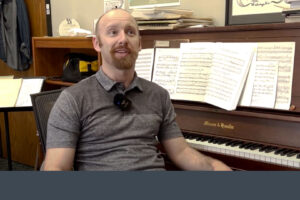AUSTIN, Texas—The College of Fine Arts at The University of Texas at Austin and the Texas Music Project (TMP) are co-sponsoring a research initiative to determine whether children have equal access to quality music instruction in public schools across Texas.
The study will also document the extent to which music education is afforded to children from the varied ethnic, socioeconomic and geographic populations in the state.
The research initiative led by Dr. Eugenia Costa-Giomi, associate professor of music at the university, will consist of two parts, a local pilot study to be completed in collaboration with the Austin Independent School District and a statewide study. The completion of a pilot study prior to gathering statewide data will allow the researchers to develop and refine the procedures and measurement instruments. The statewide study will start later this year and will take about two years.
“There is an absence of data about the state of music education in Texas’s public schools which impedes advocate groups and education decision-makers,” said Bruce Orr, co-founder of the Texas Music Project. “This research will answer basic questions about which students are afforded opportunities to enroll in and benefit from formal music education in elementary and secondary schools, the extent to which music instruction is provided by certified professionals and how much funding comes from third-party nonprofit sources and booster clubs.”
The partnership between the college and the TMP responds to concerns by educators, parents and music advocates who believe the quality of music education in schools across Texas has been deteriorating.
“We hear anecdotally that the high-stakes testing environment and attention to standardized tests—the No Child Left Behind Act and the Texas Assessment of Knowledge and Skills (TAKS)—combined with insufficient funding are affecting the quality of music education,” said Douglas Dempster, senior associate dean of the College of Fine Arts. “Professor Costa-Giomi’s research will shed light on this claim and determine whether the facts support these concerns.”
The Primary and Secondary Education Act of 2001 (No Child Left Behind) mandates student outcomes assessment—standardized testing—only in math, language arts and the natural sciences. The Act establishes a menu of rewards and sanctions, for districts, schools and teachers, based on the results of these tests.
“Understandably, most schools and districts have made the determination that students’ performance on statewide accountability measures must be the focus of their instructional energies,” Costa-Giomi said. “When pressed for time and resources, subjects without tested benchmarks often give way to the topics of the standardized tests. As a result, music education in American public education, like arts education generally, is at risk of losing its place as a central part of school curricula.”
Studies in other states have revealed alarming trends. Recent research conducted in California shows a 50 percent reduction in the number of students participating in music programs (more than 80 percent in general elementary programs) and a 30 percent reduction in music teachers over five years.
The study called “The Sound of Silence—The Unprecedented Decline of Music Education in California Public Schools: A Statistical Review” attributes a large portion of the decline to the high-stakes testing requirements of the federal No Child Left Behind Act and to inadequate public school funding. Other states like New Jersey are also reacting to this concern by implementing statewide surveys of the availability and quality of arts education in the public schools.
Former U.S. Secretary of Education Rod Paige, in a policy letter of July 2004, has referred to this situation as “both disturbing and just plain wrong,” arguing that the “No Child Left Behind Act is being interpreted [too] narrowly as to be considered the reason for these actions.”
The Texas Education Code mirrors this national situation closely. Texas law requires that all school districts offer standards-based instruction in fine arts as a condition of accreditation. However, there is much latitude allowed school districts in meeting this mandate. Because the state’s various accountability measures for public schools are derived largely from results on the Texas Assessment of Knowledge and Skills tests, arts and music learning have little or no part in school accountability measures, and thus can be inequitably supported in terms of staffing, budget and instructional time.
“Texas state law requires that we provide a well-balanced education for every child in Texas public schools,” said Robert Floyd, executive director of the Texas Music Educators Association and chair of the Texas Coalition for Quality Arts Education. “Fine arts are certainly a component of that education, and it is important that an experience in the arts, as well as all other curricular subjects, be rigorous and meaningful. I applaud the goals of the Texas Music Project research initiative. It will help us achieve our goals in music education.”
“Since its inception our organization has been a strong voice for education,” said Margaret Moran, board member and national vice president for women at the Texas League of United Latin American Citizens. We must ensure that all children throughout this great state have access to the best music instruction out there. We applaud the efforts of The University of Texas at Austin and the Texas Music Project on this very ambitious research initiative to determine what exactly we as education advocates, must do to ensure quality music education in our Texas public schools.”
The Texas Music Project is a nonprofit initiative of the Social Marketing Resource Center in conjunction with the State of Texas, the Texas music community, the Texas Music Educators Association, the Texas Commission on the Arts and the Texas Coalition for Quality Arts Education. The Texas Music Project is committed to “strengthening and restoring music education in Texas schools.”
For more information contact: Bruno Longarini, College of Fine Arts, 512-475-7021, or Bruce Orr, Texas Music Project, 214-696-1636.



